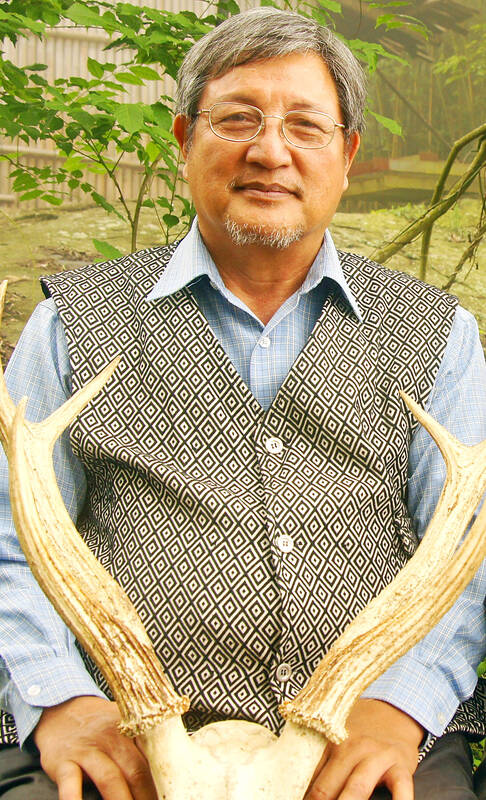Atayal cultural conservationist and artist Hitay Payan, who dedicated his life to the preservation and promotion of Atayal cultural heritage, died on Friday last week at the age of 74, the Ministry of Culture said on Tuesday.
Born in Hsinchu in 1949, Hitay Payan developed an interest in the history and culture of the Atayal people after discovering several versions of the Atayal language, and devoted himself to preserving the culture and language of his people.
Traditionally, the Atayal had no written language and used lmuhuw to pass on their language and culture from generation to generation through songs and oral communication.

Photo courtesy of the Ministry of Culture via CNA
Lmuhuw in 2011 was listed as an intangible cultural asset by the Bureau of Cultural Heritage of the then-Council for Cultural Affairs.
Hitay Payan was a member of the Taiwan Atayal People Sustainable Association, which was certified as a lmuhuw conservation group by the Hsinchu County Government in 2012. He devoted his life to preserving and promoting the culture of the Atayal, which in addition to lmuhuw included the origins and history of the Atayal people.
He wrote books in Chinese, gave talks and also participated in making documentaries.
Minister of Culture Shih Che (史哲) in a statement expressed his condolences and said the ministry would issue an official certificate in recognition of Hitay Payan’s efforts at conserving local culture.
In related news, the Council of Indigenous Peoples on Tuesday held a one-day “Forum on the Revitalization and Exchange of Austronesian Languages” at Taipei’s National Central Library, where representatives from the Canada Language Museum and Te Taura Whiri i te Reo Maori (Maori Language Commission) engaged with Taiwanese officials.
The forum was organized to bring together nations with indigenous languages so they can learn from one another, the council said.
Domestically, the council said that it hoped the forum would help it improve the Indigenous Languages Development Act (原住民族語言發展法).
By observing and learning how other nations preserve the languages of their indigenous populations, Taiwan could further advance the revitalization and restoration of the nation’s own indigenous languages, the council said.
The act was promulgated in 2017 and reflects the UN Educational, Scientific and Cultural Organization’s indigenous languages promotion and preservation efforts in 2016 and 2019, as well as the organization’s Indigenous Languages Decade program from this year to 2032.
As people at the forum spoke in their native tongues, the council arranged for live translations into English, Mandarin, Amis, Paiwan, Atayal, Bunun and Truku.

An essay competition jointly organized by a local writing society and a publisher affiliated with the Chinese Communist Party (CCP) might have contravened the Act Governing Relations Between the People of the Taiwan Area and the Mainland Area (臺灣地區與大陸地區人民關係條例), the Mainland Affairs Council (MAC) said on Thursday. “In this case, the partner organization is clearly an agency under the CCP’s Fujian Provincial Committee,” MAC Deputy Minister and spokesperson Liang Wen-chieh (梁文傑) said at a news briefing in Taipei. “It also involves bringing Taiwanese students to China with all-expenses-paid arrangements to attend award ceremonies and camps,” Liang said. Those two “characteristics” are typically sufficient

A magnitude 5.9 earthquake that struck about 33km off the coast of Hualien City was the "main shock" in a series of quakes in the area, with aftershocks expected over the next three days, the Central Weather Administration (CWA) said yesterday. Prior to the magnitude 5.9 quake shaking most of Taiwan at 6:53pm yesterday, six other earthquakes stronger than a magnitude of 4, starting with a magnitude 5.5 quake at 6:09pm, occurred in the area. CWA Seismological Center Director Wu Chien-fu (吳健富) confirmed that the quakes were all part of the same series and that the magnitude 5.5 temblor was

The brilliant blue waters, thick foliage and bucolic atmosphere on this seemingly idyllic archipelago deep in the Pacific Ocean belie the key role it now plays in a titanic geopolitical struggle. Palau is again on the front line as China, and the US and its allies prepare their forces in an intensifying contest for control over the Asia-Pacific region. The democratic nation of just 17,000 people hosts US-controlled airstrips and soon-to-be-completed radar installations that the US military describes as “critical” to monitoring vast swathes of water and airspace. It is also a key piece of the second island chain, a string of

The Central Weather Administration has issued a heat alert for southeastern Taiwan, warning of temperatures as high as 36°C today, while alerting some coastal areas of strong winds later in the day. Kaohsiung’s Neimen District (內門) and Pingtung County’s Neipu Township (內埔) are under an orange heat alert, which warns of temperatures as high as 36°C for three consecutive days, the CWA said, citing southwest winds. The heat would also extend to Tainan’s Nansi (楠西) and Yujing (玉井) districts, as well as Pingtung’s Gaoshu (高樹), Yanpu (鹽埔) and Majia (瑪家) townships, it said, forecasting highs of up to 36°C in those areas